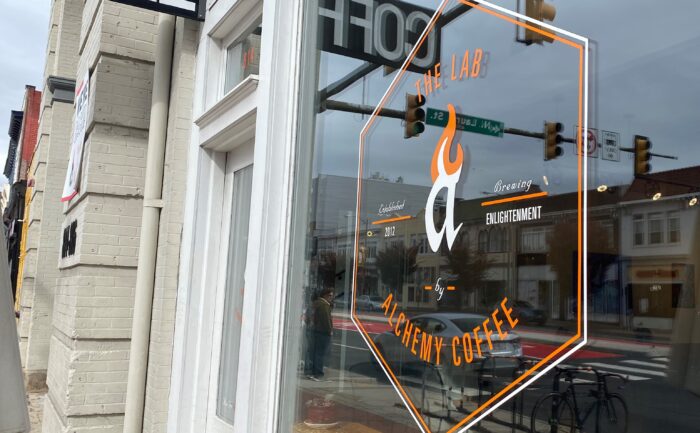In a bid to combat a tough labor market, the founder of a Richmond coffee shop wants to bring a cooperative ownership model to the business he started a decade ago.
Alchemy Coffee, which operates a cafe in Carver and a mobile coffee trailer, is working on a transition to cooperative ownership of the company.
Founder Eric Spivack said last week the shift to employee ownership is in its early stages and the timeline on restructuring would depend on how many employees decide they want to become part-owners.
Though Spivack is calling the shots now as owner, eventually he would be on an equal footing with the rest of his team in terms of decision-making and profit-sharing at Alchemy.
“It depends on how many people we start with. It would convert over time to 100 percent employee ownership. We’re not going to be there day one,” Spivack said.
Spivack said he’s introducing the change partially to help hedge against staff turnover by giving folks more reason to stick around and to provide an avenue for employee promotions. Spivack said he has seven employees.
He said his own drive toward cooperative ownership echoed a wider trend toward unionization in the coffee industry, most prominently among Starbucks employees across the country.
“My staff is doing a lot today and I want to reward that in a different manner. In coffee it’s hard to promote people. We don’t have a ton of roles and positions, especially at our scale, to advance somebody. If you’re a partial owner, that’s a form of a pretty significant advancement,” he said.
He said the company eliminated tipping in early 2021 and instituted a built-in 20 percent service fee charged to customers as part of their orders. He framed the shift toward a co-op as a continuation of his efforts to create a more progressive workplace.
“I think the idea of an employee cooperative is the next step. A progressive model that meets employees’ needs and puts everyone on the same page,” Spivack said. “I think it has been a natural evolution that the people we hired and the culture we created made people feel like they have decision-making ability. I find they’re good at taking care of things like an owner would.”
Hourly compensation at Alchemy starts at $15 an hour.
“Over the last year and a half a lot of costs have gone up on our side and on the employee side. Labor is getting more expensive and we’re looking for more relevant and significant ways to compensate people,” he said.
Spivack said some initial steps in this process include figuring out how to offer employees a means to borrow for and later pay off their co-op buy-in. He’s also exploring resources such as the San Francisco-based Democracy at Work Institute, which is a nonprofit that helps businesses convert to co-op models.
“I want to make it easy for staff and I recognize that a lot of people open to this concept may not have the capital to buy in, so I’m working with local credit unions to line that up in a way that’s efficient for them,” Spivack said.
Spivack founded Alchemy as a coffee trailer in 2012. He then opened The Lab by Alchemy coffee shop at 814 W. Broad St. in 2014.
Alchemy’s efforts would make it at least the second coffee company in Richmond to adopt a cooperative ownership model. Afterglow Coffee Cooperative, which opened a cafe in Scott’s Addition in the spring, also is employee-owned.
Another local business with a co-op model is restaurant takeout service FoodUp, which is owned by five restaurant operators.
In a bid to combat a tough labor market, the founder of a Richmond coffee shop wants to bring a cooperative ownership model to the business he started a decade ago.
Alchemy Coffee, which operates a cafe in Carver and a mobile coffee trailer, is working on a transition to cooperative ownership of the company.
Founder Eric Spivack said last week the shift to employee ownership is in its early stages and the timeline on restructuring would depend on how many employees decide they want to become part-owners.
Though Spivack is calling the shots now as owner, eventually he would be on an equal footing with the rest of his team in terms of decision-making and profit-sharing at Alchemy.
“It depends on how many people we start with. It would convert over time to 100 percent employee ownership. We’re not going to be there day one,” Spivack said.
Spivack said he’s introducing the change partially to help hedge against staff turnover by giving folks more reason to stick around and to provide an avenue for employee promotions. Spivack said he has seven employees.
He said his own drive toward cooperative ownership echoed a wider trend toward unionization in the coffee industry, most prominently among Starbucks employees across the country.
“My staff is doing a lot today and I want to reward that in a different manner. In coffee it’s hard to promote people. We don’t have a ton of roles and positions, especially at our scale, to advance somebody. If you’re a partial owner, that’s a form of a pretty significant advancement,” he said.
He said the company eliminated tipping in early 2021 and instituted a built-in 20 percent service fee charged to customers as part of their orders. He framed the shift toward a co-op as a continuation of his efforts to create a more progressive workplace.
“I think the idea of an employee cooperative is the next step. A progressive model that meets employees’ needs and puts everyone on the same page,” Spivack said. “I think it has been a natural evolution that the people we hired and the culture we created made people feel like they have decision-making ability. I find they’re good at taking care of things like an owner would.”
Hourly compensation at Alchemy starts at $15 an hour.
“Over the last year and a half a lot of costs have gone up on our side and on the employee side. Labor is getting more expensive and we’re looking for more relevant and significant ways to compensate people,” he said.
Spivack said some initial steps in this process include figuring out how to offer employees a means to borrow for and later pay off their co-op buy-in. He’s also exploring resources such as the San Francisco-based Democracy at Work Institute, which is a nonprofit that helps businesses convert to co-op models.
“I want to make it easy for staff and I recognize that a lot of people open to this concept may not have the capital to buy in, so I’m working with local credit unions to line that up in a way that’s efficient for them,” Spivack said.
Spivack founded Alchemy as a coffee trailer in 2012. He then opened The Lab by Alchemy coffee shop at 814 W. Broad St. in 2014.
Alchemy’s efforts would make it at least the second coffee company in Richmond to adopt a cooperative ownership model. Afterglow Coffee Cooperative, which opened a cafe in Scott’s Addition in the spring, also is employee-owned.
Another local business with a co-op model is restaurant takeout service FoodUp, which is owned by five restaurant operators.





I get coffee there every Saturday morning with my son, who attends VCU. I have watched as the employees hand out a small cup of coffee to a few of the homeless people that stay nearby. They come in and politely wait their turn in line. The employees do this discreetly, treating these people with dignity and respect. Whether this is company policy or not, if that is the kind of people Mr. Spivak is hiring, then more people should be taking a page out of his book. Well done, sir.